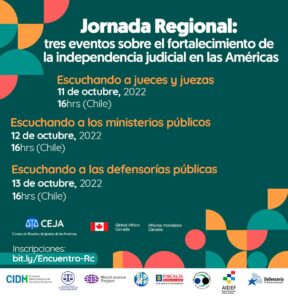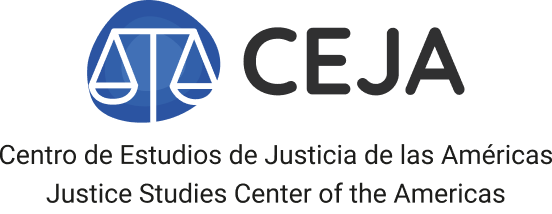 The Justice Studies Center of the Americas (JSCA), in alliance with various institutions, announces the Regional Meeting: Strengthening Judicial Independence in the Americas, to be held on October 11, 12 and 13, 2022, online, at 4 p.m. Chilean time.
The Justice Studies Center of the Americas (JSCA), in alliance with various institutions, announces the Regional Meeting: Strengthening Judicial Independence in the Americas, to be held on October 11, 12 and 13, 2022, online, at 4 p.m. Chilean time.
During this three-day meeting, JSCA will promote dialogues with justice operators from Judicial Branches (panel on October 11), Public Prosecutor’s Offices (panel on October 12) and Public Defender’s Offices (panel on October 13) to hear their voices on the challenges related to judicial independence and autonomy.
In the recent process of elaboration of the JSCA’s Strategic Plan for 2022-2026, the role that justice systems in the Americas must play in the defense and consolidation of democracy in the region was identified as one of the main challenges they face. JSCA received information regarding threats to the independence of justice institutions, which manifest themselves at different levels and in different forms.
The purpose of the Regional Meeting is to establish the state of judicial independence in Latin American countries. It will seek to identify and characterize, based on listening to the voices of the people who operate the justice systems, the explicit or implicit obstacles they face, in order to strengthen the mechanisms to safeguard judicial independence as an essential pillar of democracy.
On October 11, the panel “Listening to Judges” will be held in partnership with the Inter-American Commission on Human Rights, the Latin American Federation of Judges, the Association of Judges of Chile and the World Justice Project, with the participation of six high-level panelists: 3 judges who will share their experience regarding the state of judicial independence in the region and will delve into external or internal mechanisms that are threatening judicial independence, an expert from the Inter-American Human Rights System, who will address the existing instruments to protect judicial independence, and an expert from an international organization, to analyze forms of measurement and impacts of judicial independence.
On October 12, the panel “Listening to Public Prosecutors”, in partnership with the Ibero-American Association of Public Prosecutors, will be held, with the participation of four high-level panelists, prosecutors or former prosecutors from various countries, who will share their impressions on the subject and how in their daily actions the importance of the autonomy and independence of the Public Prosecutor’s Office materialize.
Finally, on October 13, the panel “Listening to Public Defenders” will be held, organized in partnership with the Inter-American Association of Public Defenders, the National Public Defender’s Office of Argentina, the National Public Defense Office of the Dominican Republic, the Ministry of Public Defense of Paraguay, and the Public Criminal Defense Office of Chile, with the participation of four high-level panelists: four public defenders representing different countries in the region and a thematic expert.
JSCA invites judges, public prosecutors, public defenders, litigants, administrative personnel of justice institutions, managers of public policies related to justice and the strengthening of democracy, academics and the legal community in general to participate in this event. Registration here.
The Justice Studies Center of the Americas (JSCA) is an inter-governmental agency with technical and operational autonomy that was established by resolution of the General Assembly of the Organization of American States (OAS) in fulfillment of the mandates of the Plan of Action of the Second Americas Summit (Santiago, April 1998) and the recommendations adopted during the Meetings of Ministers of Justice or Other Ministers, Prosecutors, and Attorneys General of the Americas (REMJA).
JSCA provides technical assistance to governments, judicial branches, public prosecution services, and other justice institutions; develops technical studies and generates empirical evidence; facilitates the exchange of information and best practices at the regional level; and provides specialized training to justice sector operators and public policymakers in the countries of the Americas.
